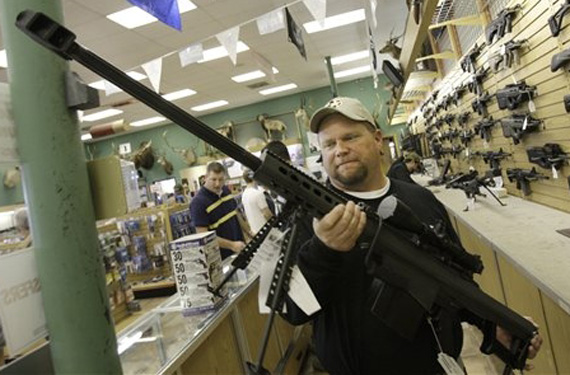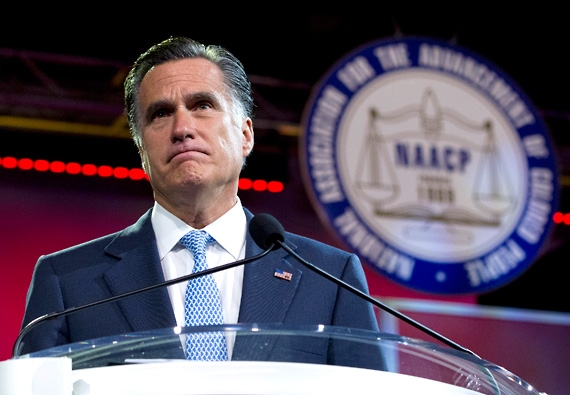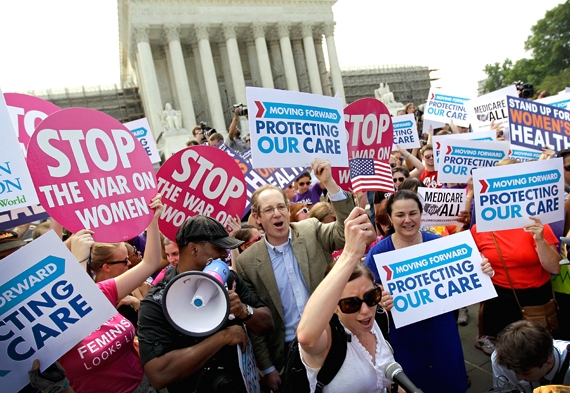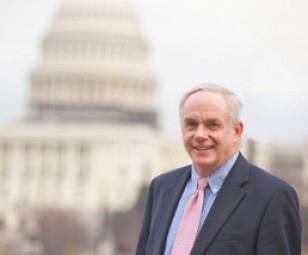
A customer checks out a .50 caliber rifle at a gun store in Fort Worth, Texas shortly after Barack Obama was elected president in 2008. This gun store and many others had record sales at the time amid fears Mr. Obama would restrict gun ownership. Photo: AP
The Rise of the Gun Lobby
We’ve seen this movie before, and I’m not talking about the latest Batman flic, “The Dark Knight Rises.” Mass shootings like the one in Colorado last week have become all too commonplace in American culture. Sadly, the reaction to these national tragedies has also become predictable. Once the initial shock and horror begin to fade, earnest discussions begin about whether we’ve been lax on gun control in this country or how to keep mass killing weapons and ammo out of the hands of unstable nut jobs.

James Holmes, 24, appeared in court July 23, on charges of killing 12 and wounding 58 others in a Colorado theater showing the latest Batman movie, “The Dark Knight Rises.” Photo: AP
All of that is getting pumped up again in the wake of the shootings in Aurora, Colorado, but a lot of political experts are predicting that when the debate turns to gun control, little will happen. In the last 20 years, there seems to have been a sea-change when it comes to the public’s appetite for more gun laws, thanks in large part to a politically astute and emboldened gun lobby, led of course by the National Rifle Association.
What the Constitution Says
Before we delve into all of that it might be worth it to consider some of the history of the gun control debate in the United States. In order to do that you have to begin with the Second Amendment to the U.S. Constitution, which reads: “A well-regulated Militia, being necessary to the security of a free State, the right of the people to keep and bear Arms, shall not be infringed.” Gun enthusiasts always cite this passage as a kind of constitutional consecration of their God-given right to own guns. Gun control proponents always focused on the first part of the amendment, the part that talks about a “well-regulated Militia” to argue that the right was not an individual right, but one reserved for organized militias. The Supreme Court had the last word on this in 2008 when a majority of the high court found that the Second Amendment does in fact refer to the rights of an individual to possess firearms without infringement by the government.
Moving into the 20th century, Congress did crack down on machine guns and other favored weapons of organized crime in the 1930’s, the so-called gangster era of U.S. history.
The gun debate took on new life in the 1960’s following the assassinations of three beloved political leaders in the United States — President John F. Kennedy in 1963, civil rights leader Dr. Martin Luther King, Jr., in 1968, followed two months later by the death of Senator Robert F. Kennedy, a Democratic Party contender for president. Congress eventually tightened some restrictions on gun ownership and sales of guns by mail, but advocates of banning handguns were never able to marshal enough support in Congress to institute a nationwide ban.
1990’s Mark a Political Shift

Then President Bill Clinton made an effort to control assault weapons sales in 1994, but the National Rifle Association and its allies in Congress fought back. Photo: AP
The balance of power in the gun control debate really began to shift in the 1990’s during the administration of President Bill Clinton. In 1994 President Clinton signed the assault weapons ban into law, a major victory for gun control advocates, especially Democrats representing urban areas around the country. But in a matter of weeks Democrats faced a major rebuke from voters in the 1994 midterm elections, losing control of the House of Representatives for the first time in 40 years. Democrats from conservative states and rural districts with strong support for gun rights were especially vulnerable and President Clinton eventually acknowledged that the gun lobby, led by the N.R.A., had a lot to do with the Republican gains.
Gun control advocates did score major victory with passage of the Brady Bill in 1990 that imposed a five-day waiting period and background check for those purchasing a handgun. The law went into effect in 1998.
In the 2000 presidential election, Democrat Al Gore narrowly lost the White House to Republican George W. Bush. One of the keys to the Bush victory was his ability to build up huge margins of support among blue collar white voters, especially in rural districts in the South, Midwest and Mountain West. Like so many other polarizing issues including abortion, gay marriage and the power of the central government, the divide between urban and rural voters has always been sharply visible in the gun control debate.
President Barack Obama has seemed reluctant to engage on the gun issue, even after last year’s mass shooting in Arizona that wounded Democratic Representative Gabrielle Giffords. In the wake of the Aurora, Colorado tragedy last week, White House officials have said little about any renewed effort to shore up gun control measures.
Late last year the Gallup Polling organization reported that public support for a variety of gun control measures was at an all-time low. Public opinion polls over the past 50 years have also shown a long trend away from gun control measures to affirming the right of Americans to own firearms.
Surveys from the early 1960’s showed that about 60 percent of people asked wanted to ban handguns. In one poll from last year, only 26 percent wanted to do that. A Pew Research survey from earlier this year found that 49 percent believe it is most important to protect gun rights, while 45 percent would prefer to focus on controlling gun ownership.

The National Rifle Association knows how to mobilize its supporters. These buttons and bumper stickers were passed out to potential Republican Party voters in the state of Iowa last winter. Photo: Reuters
The N.R.A. has been skillful in mobilizing its membership to work for those who support gun rights and against those who favor gun control. As a result, many Democrats, especially those in competitive states or who represent rural areas, have decided not to press gun control issues and to avoid a hot button issue that could get them defeated.
The N.R.A.’s cohesive supporters and their ability to rally grass roots gun groups around the country to affect elections can be an intimidating factor for politicians who might consider supporting even mild gun control measures. Even the National Democratic Party has looked away at times, believing it’s more important to keep seats in the House and Senate rather than risk a fight over gun control measures that would energize gun enthusiasts.
Nothing, and I mean nothing, impresses politicians more than the ability of voting groups to organize themselves into a potent political force that will turn out at the ballot box. And over the last 20 years it is hard to find groups more determined to protect their interests than gun rights supporters and the national groups that back them and flex their power in Washington, especially the N.R.A.



























